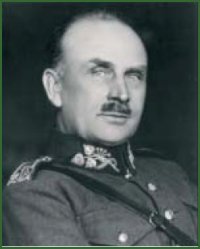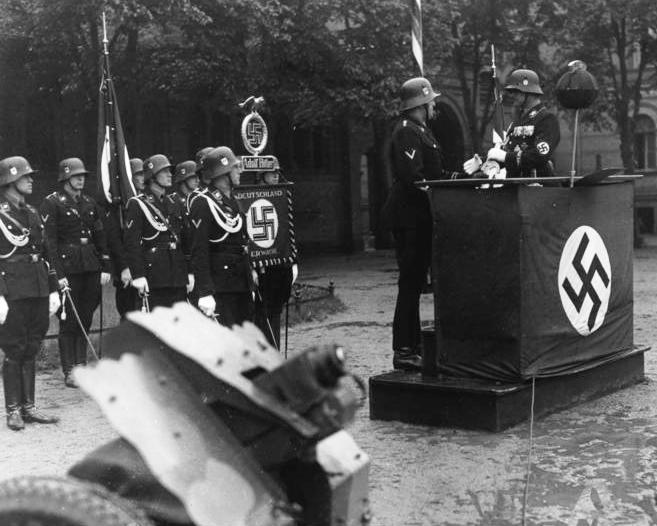|
Pankrác Prison
Pankrác Prison, officially Prague Pankrác Remand Prison (''Vazební věznice Praha Pankrác'' in Czech language, Czech), is a prison in Prague, Czech Republic. A part of the Czech Prison Service, it is located southeast of Prague city centre in Pankrác, not far from Pražského povstání Rapid transit, metro station on Line C (Prague Metro), Line C. It is used in part for persons awaiting trial and partly for convicted prisoners. Since 2008, women have also been incarcerated here. History 1885–1938 The prison was built in 1885–1889 in order to replace the obsolete St Wenceslas Prison (''Svatováclavská trestnice''), which used to stand between Charles Square and the Vltava River. At the time of its construction, the site for the new prison was out of city limits, amidst fields above Nusle suburb. Nevertheless, the expanding Prague encompassed the prison within several decades. At the time of its opening, the prison was a fairly modern institution with hot air central ... [...More Info...] [...Related Items...] OR: [Wikipedia] [Google] [Baidu] |
Guillotine
A guillotine is an apparatus designed for efficiently carrying out executions by beheading. The device consists of a tall, upright frame with a weighted and angled blade suspended at the top. The condemned person is secured with stocks at the bottom of the frame, positioning the neck directly below the blade. The blade is then released, swiftly and forcefully decapitating the victim with a single, clean pass so that the head falls into a basket or other receptacle below. The guillotine is best known for its use in France, particularly during the French Revolution, where the revolution's supporters celebrated it as the people's avenger and the revolution's opponents vilified it as the pre-eminent symbol of the violence of the Reign of Terror. While the name "guillotine" itself dates from this period, similar devices had been in use elsewhere in Europe over several centuries. The use of an oblique blade and the stocks set this type of guillotine apart from others. The display o ... [...More Info...] [...Related Items...] OR: [Wikipedia] [Google] [Baidu] |
Kobylisy Shooting Range
Kobylisy Shooting Range () is a former military shooting range located in Kobylisy, a northern suburb of Prague, Czech Republic. The shooting range was established in 1889–1891, on a site that was at the time far outside the city, as a training facility for the Austro-Hungarian (and, later, Czechoslovak) army. During the Nazi occupation it was used for mass executions as part of retaliatory measures against the Czech people after the assassination of Reinhard Heydrich in 1942. About 550 Czech patriots of every social rank were killed here, most of them between 30 May and 3 July 1942, when executions took place almost every day. Their bodies were subsequently incinerated in Strašnice Crematorium. The site was converted to a memorial after World War II, and its current dimensions date to the 1970s when the large paneláks (Communist-era tower blocks) of a new housing estate encroached upon it. Kobylisy Shooting Range has had the status of national cultural monument si ... [...More Info...] [...Related Items...] OR: [Wikipedia] [Google] [Baidu] |
Execution
Capital punishment, also known as the death penalty, is the State (polity), state-sanctioned practice of deliberately killing a person as a punishment for an actual or supposed crime, usually following an authorized, rule-governed process to conclude that the person is responsible for violating norms that warrant said punishment. The sentence (law), sentence ordering that an offender is to be punished in such a manner is known as a death sentence, and the act of carrying out the sentence is known as an execution. A prisoner who has been sentenced to death and awaits execution is ''condemned'' and is commonly referred to as being "on death row". Crimes that are punishable by death are known as ''capital crimes'', ''capital offences'', or ''capital felonies'', and vary depending on the jurisdiction, but commonly include serious Offence against the person, crimes against the person, such as murder, mass murder, Aggravation (law), aggravated cases of rape (often including child s ... [...More Info...] [...Related Items...] OR: [Wikipedia] [Google] [Baidu] |
Black Market
A black market, underground economy, or shadow economy is a clandestine market or series of transactions that has some aspect of illegality or is characterized by noncompliance with an institutional set of rules. If the rule defines the set of goods and services whose production and distribution is prohibited by law, non-compliance with the rule constitutes a black market trade since the transaction itself is illegal. Parties engaging in the production or distribution of prohibited goods and services are members of the . Examples include the illegal drug trade, prostitution (where prohibited), illegal currency transactions, and human trafficking. Violations of the tax code involving income tax evasion in the . Because tax evasion or participation in a black market activity is illegal, participants attempt to hide their behavior from the government or regulatory authority. Cash is the preferred medium of exchange in illegal transactions since cash transactions are less-easi ... [...More Info...] [...Related Items...] OR: [Wikipedia] [Google] [Baidu] |
Czechoslovak Resistance
Resistance to the German occupation of the Protectorate of Bohemia and Moravia during World War II began after the occupation of the rest of Czechoslovakia and the formation of the protectorate on 15 March 1939. German policy deterred acts of resistance and annihilated organizations of resistance. In the early days of the war, the Czech population participated in boycotts of public transport and large-scale demonstrations. Later on, armed communist partisan groups participated in sabotage and skirmishes with German police forces. The most well-known act of resistance was the assassination of Reinhard Heydrich. Resistance culminated in the so-called Prague uprising of May 1945; with Allied armies approaching, about 30,000 Czechs seized weapons. Four days of bloody street fighting ensued before the Soviet Red Army entered the nearly liberated city. Consolidation of resistance groups: ÚVOD The Czech resistance network that existed during the early years of the Second World Wa ... [...More Info...] [...Related Items...] OR: [Wikipedia] [Google] [Baidu] |
Waffen SS
The (, "Armed SS") was the combat branch of the Nazi Party's ''Schutzstaffel'' (SS) organisation. Its formations included men from Nazi Germany, along with volunteers and conscripts from both occupied and unoccupied lands. The grew from three regiments to over 38 divisions during World War II, and served alongside the German Army (''Heer''), ''Ordnungspolizei'' (uniformed police) and other security units. Originally, it was under the control of the (SS operational command office) beneath Heinrich Himmler, the head of the SS. With the start of World War II, tactical control was exercised by the (OKW, "High Command of the Armed Forces"), with some units being subordinated to (Command Staff Reichsführer-SS) directly under Himmler's control. Initially, in keeping with the racial policy of Nazi Germany, membership was open only to people of Germanic origin (so-called " Aryan ancestry"). The rules were partially relaxed in 1940, and after the Operation Barbarossa invasion ... [...More Info...] [...Related Items...] OR: [Wikipedia] [Google] [Baidu] |
Gestapo
The (), abbreviated Gestapo (; ), was the official secret police of Nazi Germany and in German-occupied Europe. The force was created by Hermann Göring in 1933 by combining the various political police agencies of Prussia into one organisation. On 20 April 1934, oversight of the Gestapo passed to the head of the ''Schutzstaffel'' (SS), Heinrich Himmler, who was also appointed Chief of German Police by Hitler in 1936. Instead of being exclusively a Prussian state agency, the Gestapo became a national one as a sub-office of the (SiPo; Security Police). From 27 September 1939, it was administered by the Reich Security Main Office (RSHA). It became known as (Dept) 4 of the RSHA and was considered a sister organisation to the (SD; Security Service). During World War II, the Gestapo played a key role in the Holocaust. After the war ended, the Gestapo was declared a criminal organisation by the International Military Tribunal (IMT) at the Nuremberg trials. History After Adol ... [...More Info...] [...Related Items...] OR: [Wikipedia] [Google] [Baidu] |
German Occupation Of Czechoslovakia
German(s) may refer to: * Germany (of or related to) ** Germania (historical use) * Germans, citizens of Germany, people of German ancestry, or native speakers of the German language ** For citizens of Germany, see also German nationality law **Germanic peoples (Roman times) * German language **any of the Germanic languages * German cuisine, traditional foods of Germany People * German (given name) * German (surname) * Germán, a Spanish name Places * German (parish), Isle of Man * German, Albania, or Gërmej * German, Bulgaria * German, Iran * German, North Macedonia * German, New York, U.S. * Agios Germanos, Greece Other uses * German (mythology), a South Slavic mythological being * Germans (band), a Canadian rock band * "German" (song), a 2019 song by No Money Enterprise * ''The German'', a 2008 short film * "The Germans", an episode of ''Fawlty Towers'' * ''The German'', a nickname for Congolese rebel André Kisase Ngandu See also * Germanic (other) * Ger ... [...More Info...] [...Related Items...] OR: [Wikipedia] [Google] [Baidu] |
Bily Josef
Bily may refer to: * Laurence Bily, French sprinter * Sydir Bily, Ukrainian Cossack * Bilyi, a different transliteration of the same Ukrainian surname Bílý (feminine Bílá) is a Czech surname meaning "white". It may refer to: *Josef Bílý, Czech general *Lucie Bílá Lucie Bílá (born April 7, 1966 as ''Hana Zaňáková'') is a Czech pop singer. According to her label, EMI Czech Republic, the singer has sold over one million albums. She won the Czech musical award, Český slavík 13 times, the highest ..., Czech singer * Věra Bílá, Czech singer See also * * Bila (other) {{White-surname Czech-language surnames Ukrainian-language surnames ... [...More Info...] [...Related Items...] OR: [Wikipedia] [Google] [Baidu] |
Munich Agreement
The Munich Agreement ( cs, Mnichovská dohoda; sk, Mníchovská dohoda; german: Münchner Abkommen) was an agreement concluded at Munich on 30 September 1938, by Nazi Germany, Germany, the United Kingdom, French Third Republic, France, and Fascist Italy (1922–1943), Italy. It provided "cession to Germany of the Sudeten German territory" of First Czechoslovak Republic, Czechoslovakia, despite the existence of a 1924 alliance agreement and 1925 military pact between France and the Czechoslovak Republic, for which it is also known as the Munich Betrayal (; ). Most of Europe celebrated the Munich agreement, which was presented as a way to prevent a major war on the continent. The four powers agreed to German occupation of Czechoslovakia, the German annexation of the Czechoslovak borderland areas named the Sudetenland, where more than three million people, mainly Sudeten Germans, ethnic Germans, lived. Adolf Hitler announced that it was his last territorial claim in Northern Europ ... [...More Info...] [...Related Items...] OR: [Wikipedia] [Google] [Baidu] |
First Czechoslovak Republic
The First Czechoslovak Republic ( cs, První československá republika, sk, Prvá česko-slovenská republika), often colloquially referred to as the First Republic ( cs, První republika, Slovak: ''Prvá republika''), was the first Czechoslovak state that existed from 1918 to 1938, a union of ethnic Czechs and Slovaks. The country was commonly called Czechoslovakia (Czech and sk, Československo), a compound of ''Czech'' and ''Slovak''; which gradually became the most widely used name for its successor states. It was composed of former territories of Austria-Hungary, inheriting different systems of administration from the formerly Austrian ( Bohemia, Moravia, a small part of Silesia) and Hungarian territories (mostly Upper Hungary and Carpathian Ruthenia). After 1933, Czechoslovakia remained the only ''de facto'' functioning democracy in Central Europe, organized as a parliamentary republic. Under pressure from its Sudeten German minority, supported by neighbouring Nazi G ... [...More Info...] [...Related Items...] OR: [Wikipedia] [Google] [Baidu] |






